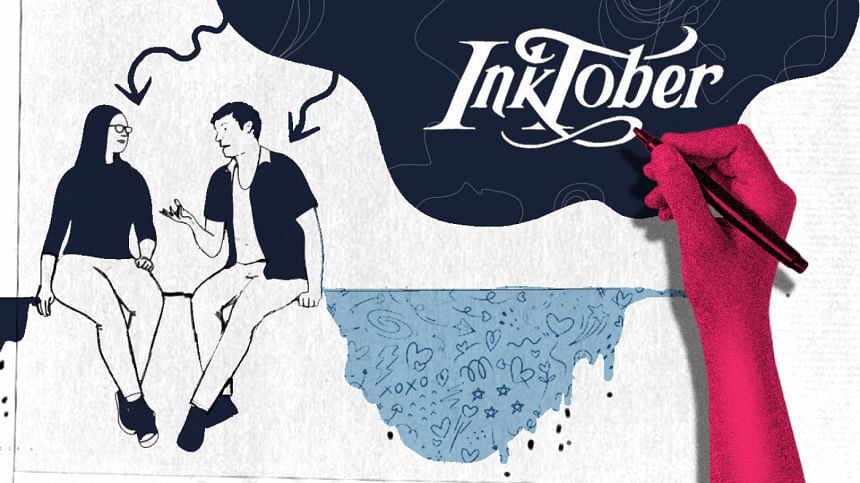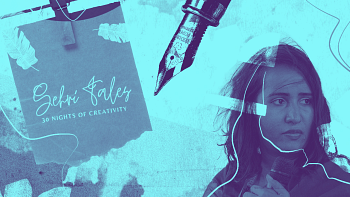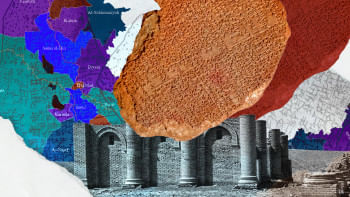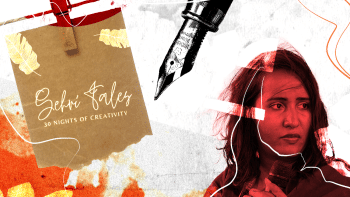Ink for days: How Inktober is its own medium of storytelling

Sabrina Fatma Ahmad is the creator of the Sehri Tales challenge, and a fairly enthusiastic Inktober participant. Abak Hussain is a writer, a Sehri Tales veteran, and is trying out the Inktober challenge for the first time. The pair sit down for a friendly chat about Inktober as a medium for storytelling.
AH: I want to start with the basics for anyone who hasn't yet come across this phenomenon. For a lot of people, ranging from professional artists to folks who have never before drawn so much as a stick figure, October is an exciting chance to jump into Inktober. I'm doing it this month for the first time, and you have been doing it for a bit longer. Can you tell us, essentially, what Inktober is?
SFA: Inktober is an annual month-long art challenge created in 2009 by New York Times best-selling illustrator Jake Parker. Basically, it's a prompt-based challenge where you look at a creative prompt every day of October, and draw something in an ink-based medium (like with markers or pens). The idea, I guess, is to do it every day for a whole month to really build confidence, and to chart your progress over that time.
AH: When you asked me to give it a shot, I wasn't sure at all. I scrolled through the previous Inktober hashtags and was absolutely floored by some of the work, and didn't know if I belonged, but then I stopped comparing myself to others and just went for it and something interesting happened. I started to get better (I won't kid myself, I'm still pretty bad), but I could really feel the growth, not just in terms of drawing, but using a new medium to tell stories. It's sort of like your very own Sehri Tales, but with pictures.
SFA: I'm glad you feel that way. While Sehri Tales started out as a different thing, when I decided to open it up to the public and set about tweaking the format, I did draw a lot of inspiration from Inktober. Interestingly, I hadn't yet attempted Inktober at that point, but as someone who doodles a lot - especially when stuck in a boring meeting - I have long known that if you doodle even a little every day, you are bound to see some growth in your skills. And with Sehri Tales, I personally felt my writing get more confident as I did it every day, so I figured, why not take some of the principles of this widely successful art challenge and apply it to what I hope will be a widely successful flash fiction challenge and see if it works? Happy to report that the format is a good fit. Coming back to Inktober, I'm happy that you didn't let the intimidatingly professional entries deter you from drawing your own.
AH: You know, to be honest, there's something fun and liberating about being a beginner and just really sucking for a while. And when you're an absolute novice there's nowhere to go but up, so sometimes I'll finish a very basic piece, literally a stick figure with big black dots for eyes, and feel mighty proud of myself. This is a feeling I don't easily get from my writing, because what I expect from myself is different there. Does that make sense?
SFA: Absolutely. And because it's a different medium, and an understanding that you're doing this for yourself, and can stop if it gets too much, the pressure is off. As you started to get a little more comfortable with the mechanics of the challenge, did you find yourself really thinking about the prompt and the 'story' you want to tell with your drawing? Like for me, personally, I enjoy the planning stage as much as I enjoy the execution of it. Maybe more.
AH: Pictures are really the most basic form of story-telling, aren't they? I imagine our ancestors sat around fires doing shadow theatre. They painted on cave walls long before writing came along. Of course, then came along movies and TV, which combine pictures and words to tell stories …
SFA: Definitely. This year, I've surprised myself a few times by sitting down with a prompt, planning what I want to draw, pulling up references to help me, and then going 'off script' and creating something I had no intention of drawing in the first place. If I manage to do all the entries, then this will be my third full Inktober, and this is the first time I've experienced this. Were there any such 'aha' moments for you, or is it too soon to be asking that?
AH: My 'aha' moment was probably three or four days in when I realised I needed to do this every day and stick with it. I think forcing yourself to think about the prompts and just doing it, day after day, is what makes Inktober what it is. For a lot of people, you use the word "creativity" in front of them and they think of it as some magical attribute that some people just have and others don't. But I think what that prompt and that schedule does is it forces you to be creative by just giving you a hard kick in the ass! It's not magic at all, just discipline.
SFA: That's pretty much why I also introduced the prompt-based element to Sehri Tales, right? So, having done both challenges, do you feel that you've learned a few things from Inktober that you could apply to your writing, or are they just completely different?
AH: Different but same. With writing the prompt is just a word, right? So you can weave a piece around it however you want, as long as the prompt is in there. With Inktober, it's probably best kept more direct and literal, like if the prompt is owl you're best off just drawing an owl rather than thinking too much about how to interpret that word and what direction to take it in. You make a stylistic choice of course as to what kind of owl to draw, hence the story-telling aspect.
SFA: …or at least till one reaches that skill level, anyway. I've seen some crazy good entries this year that made my jaws drop. Okay, I have one last question. What do you think of ink as a medium for this?
AH: It hits the spot. It's egalitarian, because pretty much everyone has access to a ballpoint pen at least. It creates a constraint which lets you focus on what to put on the page rather than have to worry about what medium to use. So it's like: Ink, paper, go!

 For all latest news, follow The Daily Star's Google News channel.
For all latest news, follow The Daily Star's Google News channel. 










Comments